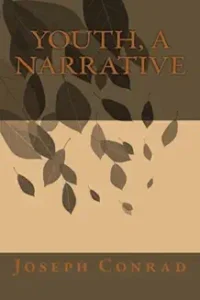Youth by Joseph Conrad 1898
This short story was written by Conrad when he was 39 years old and before his great works, ‘Lord Jim, ‘The Heart of Darkness, and ‘Victory’. It’s a story within a story, narrated by an unidentified person who introduces a story told by Marlow, the same narrator as in ‘The Heart of Darkness’. Marlow is sharing a drink with four friends, all of whom had been to sea early in their lives and who then went on to become a lawyer, an accountant, a director and the unidentified narrator.
‘Sitting round a mahogony table that reflected the bottle and the claret-glasses’. Marlow tells the tale of the Judea, a 400 ton, broken down old ship ‘all rust, dust, grime, soot aloft and dirt on the deck’ with the words ‘Do or Die’ inscribed under her name on the stern. Twenty two years ago, a 20 year old Marlow shipped out as second mate on the leaky Judea with its cargo of coal bound for Bangkok under Captain Beard, his first command at the age of 60. After putting back to port three times due to storms, leaks that required pumping for hours each day, and crews that refused to sail in that leaky boat, the Judea put out to port after the rats abandoned ship. The ship made good progress until about 200 miles from Java when the cargo of coal caught fire and began to smoke. An explosion followed by fire destroyed the ship, but Beard, first mate Mahon, and Marlow stayed with the Judea until it sank before they made their way to Java in the 3 longboats with the 12 crew members.
Marlow’s initial impression was of the East with its “mysterious shores, still water, the lands of brown nations where a stealthy Nemesis lies in wait, pursues, overtakes so many of the conquering race who are proud of their wisdom, their knowledge, of their strength. But for me all the East is contained in that vision of my youth.” So, as in ‘Lord Jim’ and ‘The Heart of Darkness’, the theme here is the misplaced sense of importance and the ignorance of the West, doomed to fail in its attempt to dominate and control the East, the primitive, the unknowable.
During his tale, Marlow often stops to reflect on youth, “the feeling that will never come back any more—the feeling that I could last for ever, outlast the sea, the earth, and all men; the deceitful feeling that lures us on to joys, to perils, to love, to vain effort—to death; the triumphant conviction of strength , the heat of life in the handful of dust, the glow in the heart that with every year grows dim, grows cold, grows small, and expires—and expires, too soon, soo soon—-before life itself.” What a magnificent description of youth and its loss to the inevitable and inexorable process of aging!
Conrad, born in what was then Poland and is now Ukraine, learned English after Polish and French, and wrote his books in English. Always feeling himself to be the outsider, he sought the meaning below the surface details of life convinced that there was some important message beyond the events of the individual’s life. His books remain vivid and read 99 years after his death.



